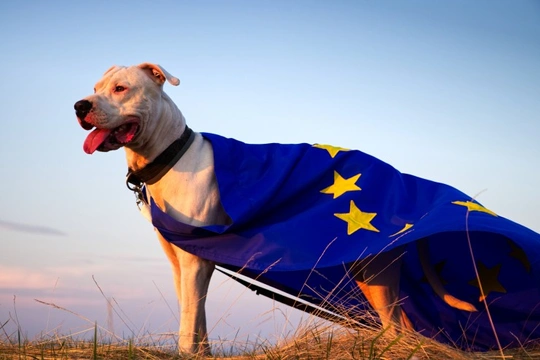
What happens with a ‘No Deal Brexit’ and travelling with our dogs?
Most of the news these days seems to centre around Brexit, the majority of us tuning out. As the current negotiations are proving unsuccessful there have been a series of advisories released by the APHA (Animal and Plant Health Agency – part of DEFRA). The government have decided to warn that should there be a no deal agreement what it would mean if you wish to take your pet abroad.
Will you still be able to travel before 29th March 2019?
Yes, there will be no ban on travelling. However, you may need to prepare should you and your pet wish to gain re-entry into the UK after the 29th March.
The current rules?
As the current rule stands your pet needs to be microchipped and vaccinated against rabies in order to be issued a pet passport.
What will you need to do with a no deal?
It depends on the category of third country the UK becomes. This is linked to a country’s animal status. The categories being either;
- Listed: Part 1
- Listed: Part 2
- Unlisted
A third country (which the UK will be) needs to apply to the European Commission to be listed under part 1 or part 2 of the annexe to the EU Pet Travel Regulations.
Should the UK become a Part 1 listed country – nothing will change with regard to the current pet travel, apart from the possibility of some minor changes to documentation. But all in all the regulations will be the same.
Should the UK become a Part 2 listed country – All the current passport regulations would still apply but pets would also require a Model Health Certificate to travel. It would be issued by an OV (Official Veterinary licensed by the government) at least 21 days post rabies vaccine and within 10 days of travel.
Should the UK become an unlisted third country, sadly it looks like a return to the old titre testing – in other words, a blood test to prove that your pet is immune to rabies.
- Pets that have previously had a blood titre test and, whose rabies vaccinations are up to date – will not require a repeat blood test.
- Pets whose vaccinations that are up to date but have not had a titre blood test will require one. The blood test will need to take place 30 days after the vaccine and be sent to an official laboratory. They will certify if the pet has enough rabies antibodies (0.5IU/ml) to protect them. If they meet this level it will be noted in the passport. BUT they still cannot travel for at least three months after the successful blood test.
The lifespan of the vaccination depends on the brand. The majority last for around 3 years.
Vaccinating your pet against rabies can range from either annually or every three years depending on the country you are visiting and the DEFRA rules. However, if your pet was vaccinated against rabies you may find they do not successfully pass the blood test, especially if the vaccination was several years ago. So, if you have a definite date of upcoming travel its worth considering a fresh rabies booster, followed by a blood test thirty days later. Your pet is more likely to pass.
Before travelling your pet must be certified as fit and healthy by an OV (Official Veterinarian), this has to happen no more than TEN days before travel.
Where does Ireland fit into this?
The UK government have made it clear we must respect our unique relationship with Ireland. The Irish government will need to discuss arrangements in the event of no deal with the European Commission and the EU Member States.
Will your pet need a booster and blood test each time before travel?
No, once the blood test is deemed successful and as long as the rabies booster is within the interval set by the EU they will need nothing else.
Don’t forget…
To enter back into the UK your dog must have a tapeworm treatment administered by a veterinary surgeon no less than 24 hours and no more than 120 hours before you check in. The vet must sign the passport to say this has been carried out. If you are going abroad for a day trip the tapeworm treatment must be administered BEFORE you leave the UK. It’s strongly advised your dog its treated for ticks at the same time.
If you’re unsure what to do next
Speak to your veterinary surgeon and check the DEFRA website for details regarding the country you wish to travel to. Your vet will no doubt advise you to vaccinate and blood titre test to cover against the worst-case scenario of ‘unlisted’ country status. Many vets now offer travel clinics to advise what parasite protection your pet requires dependant on what country you visit.
Why do you need to act now?
Because the whole process would take up to four months so if you wish to travel on the 29th March 2019… you could be out of time.



